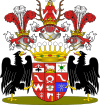Stanisław Małachowski
| Count Stanisław Małachowski |
|
|---|---|
 Portrait by Johann Baptist von Lampi the Elder Portrait by Johann Baptist von Lampi the Elder
|
|
| Prime Minister of Poland | |
|
In office October 5 – December 14, 1807 |
|
| Monarch | Frederick Augustus I |
| Preceded by | none |
| Succeeded by | Ludwik Szymon Gutakowski |
| Sejm Marshal of the Polish-Lithuanian Commonwealth | |
|
In office 1788–1792 |
|
| Monarch | Stanisław II August |
| Preceded by | Stanisław Kostka Gadomski |
| Succeeded by | Stanisław Kostka Bieliński |
| Personal details | |
| Born | 24 August 1736 Końskie, Kingdom of Poland |
| Died | 28 December 1809 (aged 73) Warsaw, Duchy of Warsaw |
| Spouse(s) | Urszula Hutten-Czapska Konstancja Hutten-Czapska |
| Profession | Nobleman, politician |
| Religion | Roman Catholic |
Count Stanisław Małachowski, of the Nałęcz coat-of-arms (Polish pronunciation: [staˈɲiswaf mawaˈxɔfskʲi]; 1736–1809) was the first Prime Minister of Poland, a member of the Polish government's Permanent Council (Rada Nieustająca) (1776–1780), Marshal of the Crown Courts of Justice from 1774, Crown Grand Referendary (1780–1792) and Marshal of the Four-Year Sejm (1788–1792).
The son of Jan Małachowski, the royal grand chancellor, Małachowski was named marshal (speaker) of the Sejm (Diet) in 1788. He was the prime force behind a constitution, adopted in 1791, that embodied such modern western European reforms as majority rule in parliament, separation of powers, and enfranchisement of the middle classes; this constitution was abrogated at the Second Partition of Poland in 1792. In 1807–09 Małachowski served as president of the senate (government) of the Duchy of Warsaw, promoted by Napoleon Bonaparte.
Born on 24 August 1736, Stanisław Małachowski came from a wealthy, powerful and influential noble family and was the son of statesman and nobleman Jan Małachowski. He studied law and was elected provincial deputy to the Sejm in 1764 . In 1771 he was appointed clerk of the United Polish crown. As a member of the House of Deputies in the Sejm, he earned great respect. He belonged to a member of the Permanent Council of the Government and was appointed Marshal (President) of the Four-year Sejm (1788-1792). In this capacity he was one of the main authors of the Constitution of May 3, 1791. He signed, as Marshal of the Sejm in 1790, the treaty of alliance with Prussia with the aim to protect Poland from foreign domination. In 1792 he negotiated in vain with a Saxon delegation on the introduction of the hereditary transmission of the Polish crown to the King of Saxony. Małachowski was stricter than Patriot opponents of the Russian party, whose main proponents scored his brother Hyacinth Małachowski. During the Russo-Polish war of 1792, he provided substantial funds and large quantities of food for the Polish troops available from his own resources. But since he could not prevent the pro-Russian Targowica Confederation, he fled abroad. He did not take part in the Kościuszko Uprising of 1794. In 1799, he was nevertheless arrested in Warsaw and imprisoned for a year in Kraków as a state prisoner, being accused of responsibility for a meeting of the Polish Sejm in Milan. After the founding of the Grand Duchy of Warsaw in 1807, he was first chairman of a provisional government commission and soon became President of the Senate. He died on 28 December 1809 and his tomb is located in the Holy Cross Church in Warsaw.
...
Wikipedia
